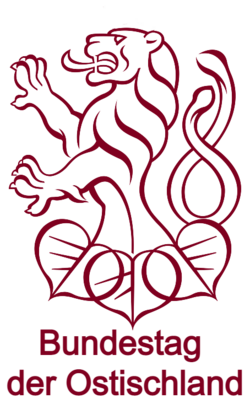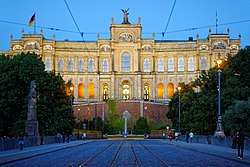Bundestag of Werania: Difference between revisions
Britbong64 (talk | contribs) No edit summary |
Britbong64 (talk | contribs) No edit summary |
||
| Line 27: | Line 27: | ||
| house1 = [[Herrstag]] | | house1 = [[Herrstag]] | ||
| house2 = [[Volkstag]] | | house2 = [[Volkstag]] | ||
| structure1 = | | structure1 = 2021 Herrstag.svg | ||
| structure1_res = 270px | | structure1_res = 270px | ||
| structure1_alt = | | structure1_alt = | ||
| Line 33: | Line 33: | ||
| structure2_res = 270px | | structure2_res = 270px | ||
| structure2_alt = | | structure2_alt = | ||
| political_groups1 ={{Collapsible list |title= |{{legend|#F0001C|[[Weranic Section of the Workers' International|OSAI]]: | | political_groups1 ={{Collapsible list |title= |{{legend|#F0001C|[[Weranic Section of the Workers' International|OSAI]]: 6 seats}} {{legend|#258B4C|[[Green Party (Werania)|Greens]]: 9 seats}} {{legend|#ED1651|[[Social Democratic Radical Party of Werania|SRPO]]: 59 seats}} {{legend|#F2D200|[[National Coalition for Independence|NNK]]: 10 seats}} {{legend|#019CDB|[[Modern Centre Party (Werania)|PMZ]]: 7 seats}} {{legend|#dddddd|{{wp|Independent (politics)|Nonpartisan}}: 5 seats}} {{legend|#04428B|[[Sotirian Democratic Homeland|SDT]]: 4 seats}} {{legend|#FF6A00|[[National Consolidation Party|NKP]]: 130 seats}} {{legend|#116468|[[Democratic Alternative (Werania)|DA]]: 2 seats}} | ||
}} | }} | ||
| political_groups2 = {{Collapsible list |title= |{{legend|#F0001C|[[Weranic Section of the Workers' International|OSAI]]: 22 seats | | political_groups2 = {{Collapsible list |title= |{{legend|#F0001C|[[Weranic Section of the Workers' International|OSAI]]: 22 seats}} {{legend|#258B4C|[[Green Party (Werania)|Greens]]: 80 seats}} {{legend|#ED1651|[[Social Democratic Radical Party of Werania|SRPO]]: 85 seats}} {{legend|#ADCFEF|[[Aldman People's Party|AVP]]: 2 seats}} {{legend|#F2D200|[[National Coalition for Independence|NNK]]: 31 seats}} {{legend|#019CDB|[[Modern Centre Party (Werania)|PMZ]]: 32 seats}} {{legend|#04428B|[[Sotirian Democratic Homeland|SDT]]: 9 seats}} {{legend|#26C4EC|[[United Party (Charlotte Island)|VP/AP]]: 1 seat}} {{legend|#FF6A00|[[National Consolidation Party|NKP]]: 244 seats}} {{legend|#116468|[[Democratic Alternative (Werania)|DA]]: 30 seats}} {{legend|#261060|[[Weranic Völkisch Freedom Party|OVFP]]: 9 seats}} | ||
}} | }} | ||
| committees1 = | | committees1 = | ||
| Line 59: | Line 59: | ||
| seats8_title = | | seats8_title = | ||
| seats8 = | | seats8 = | ||
| voting_system1 = {{wp|First-past-the-post}} | | voting_system1 = {{wp|First-past-the-post|FPTP}}/{{Wp|Single non-transferable vote|SNTV}} | ||
| voting_system2 = {{wp|Parallel system}} ( {{wp|First-past-the-post|FPTP}}/{{wp|Proportional representation|PR}}) | |||
| first_election1 = | | first_election1 = | ||
| first_election2 = | | first_election2 = | ||
| first_election3 = | | first_election3 = | ||
| last_election1 = [[ | | last_election1 = [[2021 Weranian Herrstag election|2021]] | ||
| last_election2 = [[2019 Weranian federal election|2019]] | | last_election2 = [[2019 Weranian federal election|2019]] | ||
| last_election3 = | | last_election3 = | ||
| next_election1 = [[ | | next_election1 = [[2024 Weranian Herrstag election|2024]] | ||
| next_election2 = [[Next Weranian federal election|2023]] | | next_election2 = [[Next Weranian federal election|2023]] | ||
| next_election3 = | | next_election3 = | ||
| Line 86: | Line 86: | ||
The '''Bundestag of Werania''' ({{Wp|German language|Weranian}}: '''Bundestag der Ostischland'''; ''Federal Diet'') is the {{wp|Bicameralism|bicameral}} {{Wp|legislature}} of the [[Werania]]. It consists of an {{Wp|upper house}} known as the [[Herrstag]] (Lord's Chamber) and a {{wp|lower house}} known as the [[Volkstag]] (People's Chamber) whilst the monarch presides over parliamentary proceedings. It retains {{wp|parliamentary sovereignty}} over Werania, officially being the representative of the Weranian people. Members of the ''Herrstag'' are referred to as Peers whilst members of the ''Volkstag'' are known as the {{Wp|members of parliament|deputies}}. | The '''Bundestag of Werania''' ({{Wp|German language|Weranian}}: '''Bundestag der Ostischland'''; ''Federal Diet'') is the {{wp|Bicameralism|bicameral}} {{Wp|legislature}} of the [[Werania]]. It consists of an {{Wp|upper house}} known as the [[Herrstag]] (Lord's Chamber) and a {{wp|lower house}} known as the [[Volkstag]] (People's Chamber) whilst the monarch presides over parliamentary proceedings. It retains {{wp|parliamentary sovereignty}} over Werania, officially being the representative of the Weranian people. Members of the ''Herrstag'' are referred to as Peers whilst members of the ''Volkstag'' are known as the {{Wp|members of parliament|deputies}}. | ||
The Bundestag took its current form in 1842 following the unification of Werania, being based on the former Reichstag of the [[Kingdom of Cislania]]. The Lord's Chamber was initially entirely hereditary or appointed by the monarch of Werania whilst members of the People's Chamber were elected in a {{Wp|first-past-the post}} system. In 1905 the government introduced {{Wp| | The Bundestag took its current form in 1842 following the unification of Werania, being based on the former Reichstag of the [[Kingdom of Cislania]]. The Lord's Chamber was initially entirely hereditary or appointed by the monarch of Werania whilst members of the People's Chamber were elected in a {{Wp|first-past-the post}} system. In 1905 the government introduced {{Wp|proportional representation}} for the People's Chamber. In 1956 the People's Chamber voting system was changed again to a {{wp|parallel system}} with a portion of the seats elected through FPTP and a portion through PR. The Lord's Chamber remained unreformed until 1991 when the government changed the composition of the Chamber to entirely elected. | ||
Currently | Currently 245 members of the Volkstag are elected through single member districts and 300 through proportional representation whilst whilst all members of the Herrstag are elected via FPTP and SNTV in multi-member districts with half the members elected every six years to three year terms. The next Volkstag election is expected in 2023; the next Herrstag election is in 2024. | ||
==History== | ==History== | ||
==Composition== | ==Composition== | ||
Revision as of 03:18, 24 January 2021
Bundestag of Werania Bundestag der Ostischland | |
|---|---|
 | |
| Type | |
| Type | |
| Houses | Herrstag Volkstag |
| Leadership | |
Monarch | Charlotte II since 22 March 2014 |
Speaker of the Herrstag | |
Speaker of the Volkstag | |
| Structure | |
| Seats | 232 (Herrstag) 545 (Volkstag) |
 | |
Herrstag political groups | |
 | |
Volkstag political groups | |
| Elections | |
| FPTP/SNTV | |
Herrstag last election | 2021 |
Volkstag last election | 2019 |
Herrstag next election | 2024 |
Volkstag next election | 2023 |
| Meeting place | |
 | |
| Palace of Parliament, Westbrücken, Werania | |
The Bundestag of Werania (Weranian: Bundestag der Ostischland; Federal Diet) is the bicameral legislature of the Werania. It consists of an upper house known as the Herrstag (Lord's Chamber) and a lower house known as the Volkstag (People's Chamber) whilst the monarch presides over parliamentary proceedings. It retains parliamentary sovereignty over Werania, officially being the representative of the Weranian people. Members of the Herrstag are referred to as Peers whilst members of the Volkstag are known as the deputies.
The Bundestag took its current form in 1842 following the unification of Werania, being based on the former Reichstag of the Kingdom of Cislania. The Lord's Chamber was initially entirely hereditary or appointed by the monarch of Werania whilst members of the People's Chamber were elected in a first-past-the post system. In 1905 the government introduced proportional representation for the People's Chamber. In 1956 the People's Chamber voting system was changed again to a parallel system with a portion of the seats elected through FPTP and a portion through PR. The Lord's Chamber remained unreformed until 1991 when the government changed the composition of the Chamber to entirely elected.
Currently 245 members of the Volkstag are elected through single member districts and 300 through proportional representation whilst whilst all members of the Herrstag are elected via FPTP and SNTV in multi-member districts with half the members elected every six years to three year terms. The next Volkstag election is expected in 2023; the next Herrstag election is in 2024.